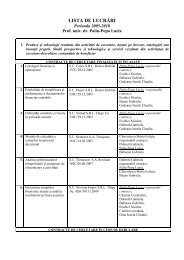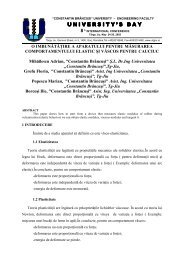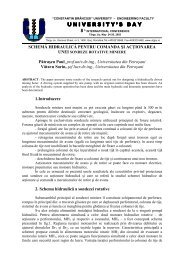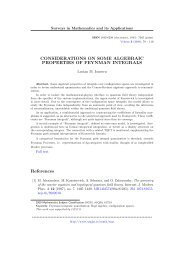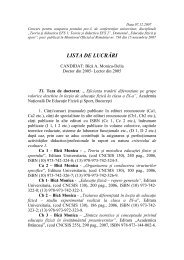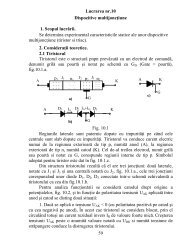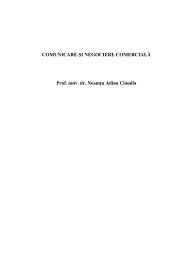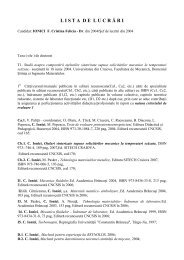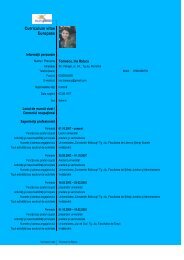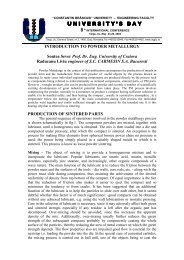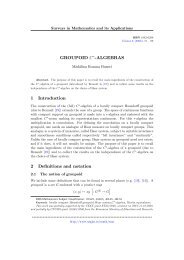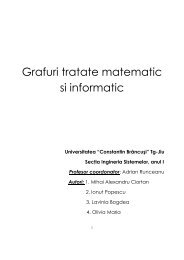NO. 2 / 2008 - Universitatea "Constantin BrâncuÅi"
NO. 2 / 2008 - Universitatea "Constantin BrâncuÅi"
NO. 2 / 2008 - Universitatea "Constantin BrâncuÅi"
You also want an ePaper? Increase the reach of your titles
YUMPU automatically turns print PDFs into web optimized ePapers that Google loves.
Analele Universităţii “<strong>Constantin</strong> Brâncuşi” din Târgu Jiu, Seria Litere şi Ştiinţe Sociale, Nr. 2/<strong>2008</strong>poate îndupleca pe altcineva. Desigur,ştiinţa nu este o poveste şi pretenţia sa deobiectivitate este bine stabilită prinperfecţiunea internă şi confirmarea externă,cum ar spune Einstein, dar ştiinţa nu seadresează nucleului experienţei noastre.Acest lucru ne duce la punctul al doilea:opacitatea raţională fundamentală – nuexperenţială a lumii comune.Acum că ni s-au furnizat acesteconcepte complementare, putem reformulaîntrebarea acestei probleme speciale: în cecondiţii categoriale vor fi savanţii nu numaiconvinşi dar şi înduplecaţi de virtuţile (maidegrabă decât de viciile) gândirii procesuluilui Whiteheadian? Pentru a păstra discuţianoastră strânsă, vom adăuga un filtrusuplimentar inspirat de modul curent în caresunt conduse dezbaterile (sau prevenite) înAcademie. Filtrul nu este dogmatic, cieuristic; el reprezintă mai puţin o pretenţiedecât o simplificare evidentă care nepermite să obţinem o sinteză promptă.Să începem cu faptul nostruuniversal ipotetic (sau filtru): specialiştii(aproape) niciodată nu vorbesc serios cusavanţii care nu au aceeaşi experienţă —dacă nu intră în categoria „studenţilor” şi levorbesc. Excepţiile fiind lăsate deoparte (şiele sunt mai remarcabile), dezbaterile au deobicei loc între puţinii care împărtăşescaceeaşi grijă despre un domeniu alexperienţei şi nu au într-adevăr nevoie să îşiexpună la infinit presupunerile şi sensul şisemnificaţia conceptelor lor. Pe scurt:niciodată cunoştinţele expertului nu suntriscate de o discuţie deschisă într-adevăr.În afară de jocurile de putereevidente care au loc într-un domeniu dat,ceea ce izbeşte un observator intern esteaccentul pe convingerea raţională. Puncteleraţionale la natura argumentelor care tindsă se axeze pe probleme de coerenţă şiconsistenţă. Convingerea empirică va animaun alt teatru, după cum vom observaimediat.Specialiştii au facultatea de a sebucura numai de scrierile filozofice aleunicului lor filozof ales. Filozofia este clarreason is obliterated by a healthyrelativism. There are no “right” reasons tostop smoking; everyone can have a differentone, that can be convincing and perhapseven persuading to others. Of course,science is not a fairy tale and its claim toobjectivity is well established by internalperfection and external confirmation asEinstein would say, but science does notaddress the core of our experience. Thisbrings us to the second point: thefundamental rational—not experiential—opacity of the common world.Now that we are equipped with thesecomplementary concepts, we can rephrasethe question of this special issue: underwhat categoreal conditions will scholars benot only convinced but also persuaded ofthe virtues (rather than the vices) ofWhiteheadian process thought? In order tokeep our discussion tight, we will add anadditional filter inspired by the current waydebates are lead (or prevented) in theAcademia. That filter is not dogmatic butheuristic; it constitutes less a bold claimthan an obvious simplification that allowsto obtain promptly a provisional synthesis.Let us start with our hypotheticaluniversal fact (or filter): specialists (almost)never seriously talk to scholars who do nothappen to share the very same expertise—unless these fall under the category of“students” and in that case they are equallylikely to talk at them. Exceptions put aside(and they are all the more remarkable),debates are usually taking place among thehappy few who share the same concernabout one field of expertise and do notreally need to expose endlessly theirpresuppositions and the meaning andsignificance of their concepts. In short:never is the expert knowledge put at risk bya truly open discussion.Besides the equally obvious powergames that take place within a givendomain, what strikes the internal observer isthe emphasis on rational conviction.Rational points here at the nature of thearguments that tend to focus on issues ofAnnals of the „<strong>Constantin</strong> Brâncuşi” University of Târgu Jiu, Series Letters and Social Sciences, No. 2/<strong>2008</strong>44



